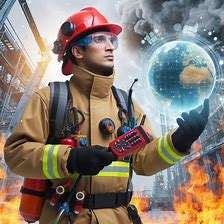Bachelor of Vocation (B.Voc) in Fire Technology and Industrial Safety Management is a specialized undergraduate program aimed at providing students with comprehensive training in various aspects of fire safety, industrial safety, risk management, and emergency response. This program focuses on equipping students with the technical skills, knowledge, and practical experience necessary to prevent, mitigate, and manage fire-related incidents and industrial hazards. Below is a detailed description of the program:
- Duration: The B.Voc program in Fire Technology and Industrial Safety Management typically spans three years, divided into semesters.
- Curriculum: The curriculum is designed to cover a wide range of topics related to fire safety, industrial safety, risk assessment, emergency planning, disaster management, and regulatory compliance. It integrates theoretical knowledge with practical applications to prepare students for roles in ensuring safety in various industries and environments.
- Practical Training: Emphasis is placed on hands-on training through practical exercises, simulations, field visits, workshops, and internships. Students gain practical experience in fire prevention, firefighting techniques, rescue operations, hazard identification, and safety inspections.
- Industry Alignment: The curriculum is regularly updated to align with industry standards, regulations, and best practices in fire safety and industrial safety management. Collaboration with industry partners, guest lectures from safety professionals, and participation in safety drills and workshops provide students with real-world experience and networking opportunities.
- Internship and Placement: Students undergo internships with fire departments, safety consulting firms, industrial facilities, or regulatory agencies to gain practical experience and industry exposure. Placement assistance is provided to students to secure job opportunities upon graduation.
- Core Subjects:
– Fire Science and Technology
– Industrial Safety Management
– Occupational Health and Safety
– Hazard Identification and Risk Assessment
– Emergency Response Planning
– Fire Prevention and Protection Systems
– Disaster Management
– Environmental Safety Management
– Legal and Regulatory Compliance in Safety - Specialization Electives:
– Advanced Firefighting Techniques
– Hazardous Materials Management
– Construction Safety Management
– Electrical Safety
– Chemical Safety
– Process Safety Management
– Safety in Oil and Gas Industry
– Transportation Safety - Practical Training Modules:
- Fire Drill and Firefighting Exercises: Practical training in using firefighting equipment, extinguishing fires, conducting rescue operations, and managing emergency situations.
- Safety Inspections and Audits: Conducting safety inspections, identifying hazards, and recommending corrective measures to ensure compliance with safety regulations.
- Emergency Response Simulations: Simulating emergency scenarios, such as fires, chemical spills, and natural disasters, to develop response plans and improve coordination.
- Industry Projects and Case Studies:
- Students undertake industry projects and case studies to analyze real-world safety management scenarios, develop safety plans, and make strategic decisions.
- Projects may focus on areas such as risk assessment, safety training programs, incident investigations, and safety culture enhancement initiatives.
- Technical Knowledge: Understanding of fire science, safety regulations, hazard identification, risk assessment methodologies, and emergency response procedures.
- Problem-Solving Skills: Analytical thinking and problem-solving abilities to assess safety risks, develop mitigation strategies, and respond effectively to emergencies.
- Communication Skills: Clear communication of safety procedures, instructions, and reports to stakeholders, employees, and regulatory authorities.
- Leadership and Teamwork: Ability to lead safety initiatives, coordinate emergency response efforts, and work effectively in multidisciplinary teams.
- Attention to Detail: Precision and attention to detail in conducting safety inspections, audits, and risk assessments to ensure accuracy and completeness.
- Decision-Making: Making informed decisions under pressure during emergencies, prioritizing actions, and evaluating alternative courses of action.
- Crisis Management: Calmness, composure, and quick decision-making in high-stress situations to ensure the safety and well-being of individuals and property.
- Technical Knowledge: Understanding of fire science, safety regulations, hazard identification, risk assessment methodologies, and emergency response procedures.
- Problem-Solving Skills: Analytical thinking and problem-solving abilities to assess safety risks, develop mitigation strategies, and respond effectively to emergencies.
- Communication Skills: Clear communication of safety procedures, instructions, and reports to stakeholders, employees, and regulatory authorities.
- Leadership and Teamwork: Ability to lead safety initiatives, coordinate emergency response efforts, and work effectively in multidisciplinary teams.
- Attention to Detail: Precision and attention to detail in conducting safety inspections, audits, and risk assessments to ensure accuracy and completeness.
- Decision-Making: Making informed decisions under pressure during emergencies, prioritizing actions, and evaluating alternative courses of action.
- Crisis Management: Calmness, composure, and quick decision-making in high-stress situations to ensure the safety and well-being of individuals and property.
B.Voc in Fire Technology and Industrial Safety Management is a specialized program that prepares students for rewarding careers in ensuring safety in various industries and environments. By providing a blend of theoretical knowledge, practical training, and industry exposure, the program equips graduates with the skills and expertise needed to prevent, mitigate, and manage fire-related incidents, industrial hazards, and emergencies. With a focus on hands-on training, industry alignment, and internship opportunities, graduates are well-positioned to pursue roles as safety officers, fire safety managers, health and safety consultants, emergency response coordinators, and safety trainers in industries such as manufacturing, construction, oil and gas, transportation, and government agencies.
